Daily Vocabulary Words: List of Daily Used Words in Leading Indian Newspapers
Hi there. Welcome to this special section @ Wordpandit. Our endeavour here is straightforward: highlighting daily vocabulary words that you would come across in leading newspapers in the country. We have included the following newspapers in our selection:
• The Times of India
• The Economic Times
• Hindustan Times
• Mint
• Indian Express
We are putting in extensive work to develop your vocabulary. All you have to do is be regular with this section and check out this post daily. This is your repository of commonly used words; essentially, we are posting a list of daily used words. Hence, this has significant practical application as it teaches you words that are commonly used in leading publications mentioned above.
Visit the website daily to learn words from leading Indian newspapers.
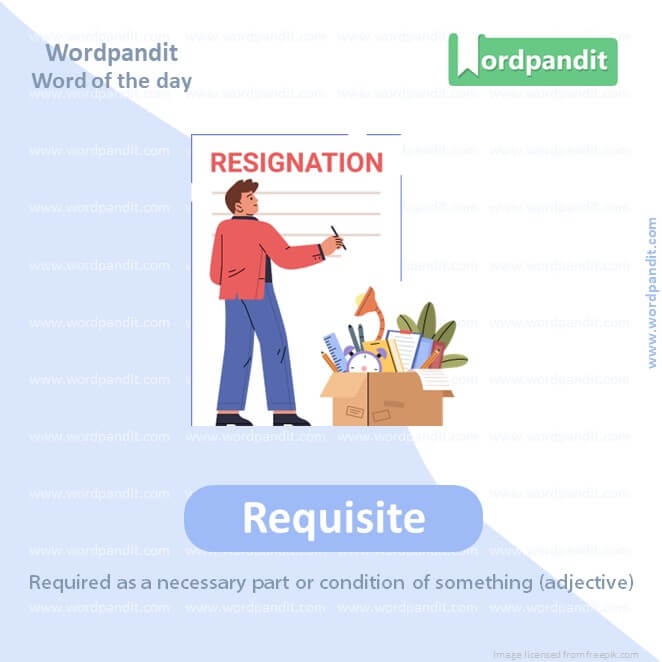
WORD-1: Requisite
CONTEXT: The fact is that, today, neither the CGWB nor any other institution, Centre or state, has the requisite technical knowhow.
SOURCE: Indian Express
EXPLANATORY PARAGRAPH: ‘Requisite’ is like something you really need to have to do something else. Like you need a pencil to write or shoes to go outside. It’s something very important that you can’t do without.
MEANING: Required as a necessary part or condition of something (adjective).
PRONUNCIATION: rek-wuh-zit
SYNONYMS: Necessary, Essential, Required, Mandatory, Vital, Needed
USAGE EXAMPLES:
1. A good education is a requisite for a successful career.
2. Patience is a requisite quality for teachers.
3. He lacked the requisite experience for the job.
4. Safety equipment is a requisite in construction sites.
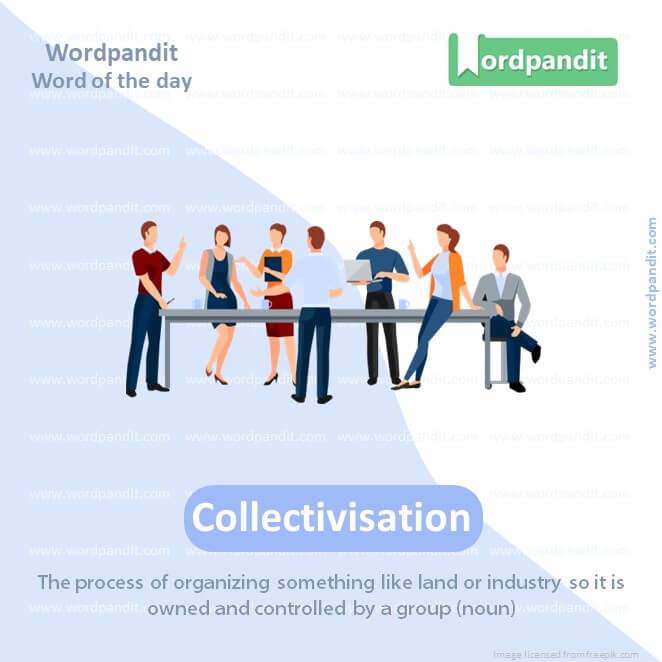
WORD-2: Collectivisation
CONTEXT: Such collectivisation is a political process which should begin with a factual study and report.
SOURCE: Indian Express
EXPLANATORY PARAGRAPH: ‘Collectivisation’ is like when everyone in class brings their toys together to share and play as a group. It’s about bringing things together so everyone can use them, like farms or businesses.
MEANING: The process of organizing something like land or industry so it is owned and controlled by a group (noun).
PRONUNCIATION: kuh-lek-tiv-eye-zay-shun
SYNONYMS: Centralization, Socialization, Communalization, Nationalization, Group ownership
USAGE EXAMPLES:
1. Collectivisation of farms was a major policy in some countries.
2. The government embarked on collectivisation efforts.
3. She studied the effects of collectivisation on agricultural production.
4. Collectivisation led to significant changes in rural areas.
WORD-3: Articulated
CONTEXT: these core developmental problems are not articulated at the hustings doesn’t mean that they don’t exist.
SOURCE: Indian Express
EXPLANATORY PARAGRAPH: ‘Articulated’ is like explaining something very clearly, so everyone understands. Like when you tell a story and you say every part so well that your friends can see it in their minds.
MEANING: Expressed something clearly and effectively (verb).
PRONUNCIATION: ar-tik-yuh-lay-ted
SYNONYMS: Expressed, Enunciated, Clarified, Explained, Elucidated, Detailed
USAGE EXAMPLES:
1. She articulated her thoughts very clearly.
2. The teacher articulated the instructions to the students.
3. His ideas were well articulated in the article.
4. He articulated the plan for the project.
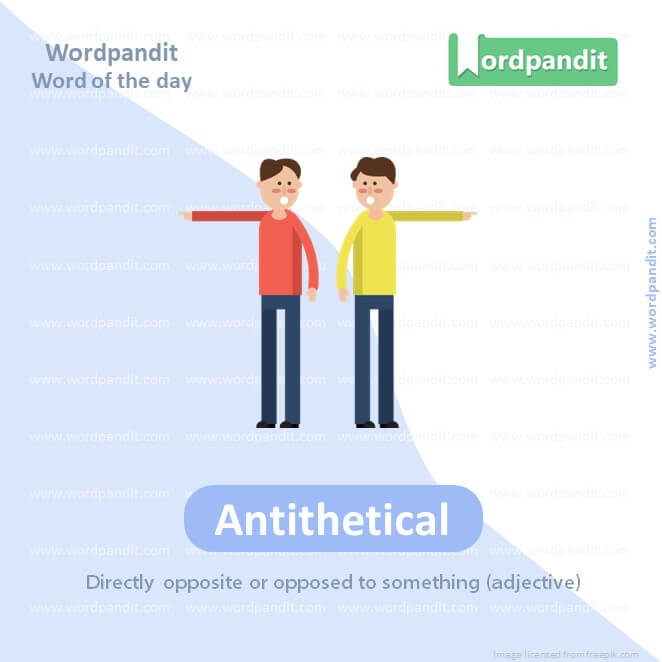
WORD-4: Antithetical
CONTEXT: the people themselves need to comprehend the issues involved. A centralised science, as we have, is antithetical to this.
SOURCE: Indian Express
EXPLANATORY PARAGRAPH: ‘Antithetical’ is when two things are the complete opposite of each other. Like hot and cold, or day and night. They are so different, they are exactly the opposite.
MEANING: Directly opposite or opposed to something (adjective).
PRONUNCIATION: an-ti-thet-i-kul
SYNONYMS: Opposite, Contrary, Inverse, Counter, Opposed, Contradictory
USAGE EXAMPLES:
1. Their views are antithetical to ours.
2. Violence is antithetical to their philosophy.
3. The concept is antithetical to basic principles.
4. His actions were antithetical to his words.
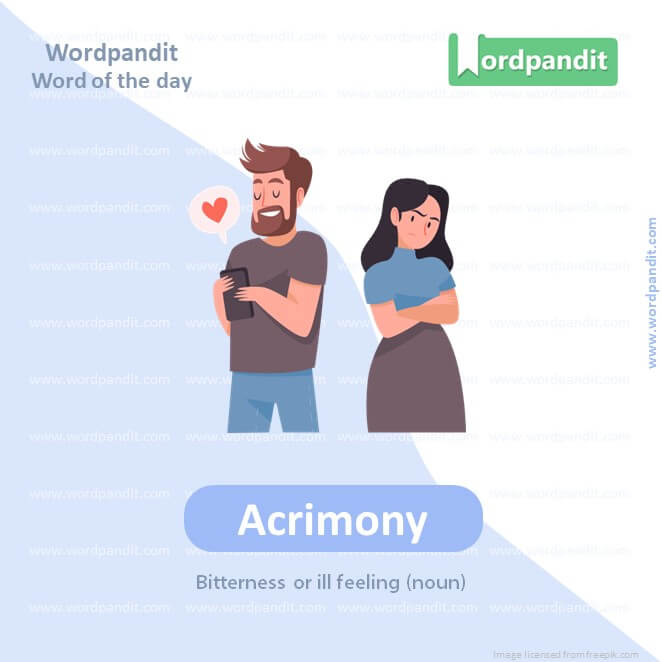
WORD-5: Acrimony
CONTEXT: This causes much acrimony and a loss of focus on serious matters of development.
SOURCE: Indian Express
EXPLANATORY PARAGRAPH: ‘Acrimony’ is when people are very angry and speak in a mean way. Like when someone says unkind things during a fight. It’s being really upset and showing it.
MEANING: Bitterness or ill feeling (noun).
PRONUNCIATION: ak-ri-moh-nee
SYNONYMS: Bitterness, Resentment, Hostility, Animosity, Rancor, Ill will
USAGE EXAMPLES:
1. The discussion ended in acrimony.
2. There was acrimony between the two leaders.
3. The debate was filled with acrimony.
4. Acrimony marked their relationship.
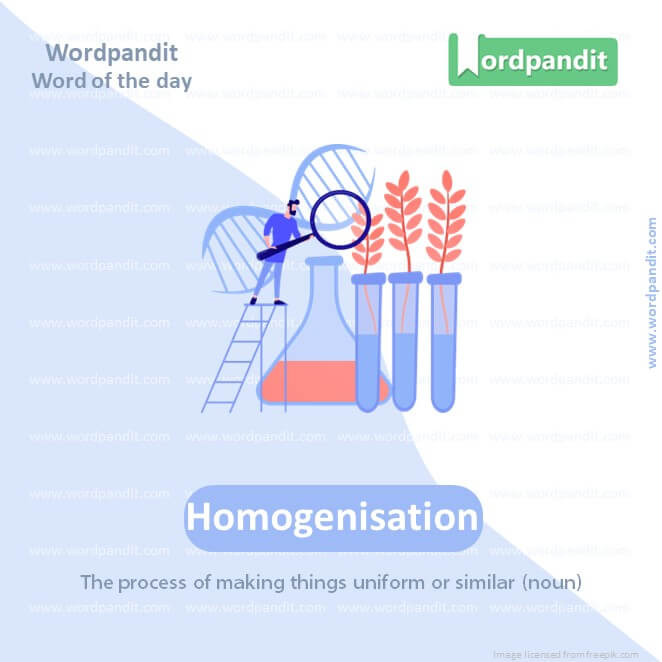
WORD-6: Homogenisation
CONTEXT: It may well be that excessive centralisation and homogenisation in a diverse country such as ours is making governance difficult.
SOURCE: Indian Express
EXPLANATORY PARAGRAPH: ‘Homogenisation’ is like mixing different things until they are all the same. Like when you blend fruits together to make a smoothie. Everything becomes mixed up and the same.
MEANING: The process of making things uniform or similar (noun).
PRONUNCIATION: ho-muh-juh-ni-zay-shun
SYNONYMS: Standardization, Unification, Assimilation, Conformity, Evenness
USAGE EXAMPLES:
1. The homogenisation of culture is a global phenomenon.
2. Homogenisation in the industry has reduced diversity.
3. The homogenisation process ensures consistency in milk.
4. He criticized the homogenisation of modern society.
WORD-7: Incessantly
CONTEXT: Time’s healing power is truth, which triumphs over the arrogance of falsehood. Justice struggles incessantly against injustice, and emerges victorious.
SOURCE: Indian Express
EXPLANATORY PARAGRAPH: ‘Incessantly’ means something happens all the time without stopping. Like when it rains for days and days without a break, or a clock that keeps ticking every second.
MEANING: Without stopping; continuously (adverb).
PRONUNCIATION: in-ses-uhnt-lee
SYNONYMS: Constantly, Continuously, Endlessly, Unceasingly, Perpetually, Uninterruptedly
USAGE EXAMPLES:
1. The rain fell incessantly for hours.
2. He talked incessantly about his hobbies.
3. The clock ticked incessantly.
4. She worked incessantly to meet the deadline.
WORD-8: Reconciliation
CONTEXT: Justice struggles incessantly against injustice, and emerges victorious. War submits to peace. Construction follows destruction, and reconciliation replaces rancour.
SOURCE: Indian Express
EXPLANATORY PARAGRAPH: ‘Reconciliation’ is like when two friends who had a fight make up and become friends again. It’s about solving problems and being nice to each other again.
MEANING: The process of making two opposing sides agree or become friendly again (noun).
PRONUNCIATION: re-kon-sil-ee-ay-shun
SYNONYMS: Resolution, Settlement, Agreement, Harmony, Accord, Amends
USAGE EXAMPLES:
1. They sought reconciliation after the argument.
2. The peace talks led to reconciliation between the countries.
3. Reconciliation is important in any relationship.
4. The process of reconciliation can be challenging.
WORD-9: Rancour
CONTEXT: Justice struggles incessantly against injustice, and emerges victorious. War submits to peace. Construction follows destruction, and reconciliation replaces rancour.
SOURCE: Indian Express
EXPLANATORY PARAGRAPH: ‘Rancour’ is when someone feels really angry and holds a grudge. It’s like staying mad at someone for a long time, even after the fight is over.
MEANING: Bitter, deep-seated ill will or resentment (noun).
PRONUNCIATION: ran-ker
SYNONYMS: Bitterness, Resentment, Animosity, Hatred, Malice, Hostility
USAGE EXAMPLES:
1. The debate was full of rancour.
2. He spoke without rancour despite the betrayal.
3. Their relationship was marked by rancour.
4. She harbored rancour against her rival.
WORD-10: Enchanting
CONTEXT: When that happens, battlefields make way for schools, universities, hi-tech industries, verdant rice fields, sports stadiums, bustling markets, and enchanting tourist resorts.
SOURCE: Indian Express
EXPLANATORY PARAGRAPH: ‘Enchanting’ is like something so beautiful or magical that it seems like a fairy tale. Like a gorgeous princess or a magical forest that makes you feel very happy and amazed.
MEANING: Delightfully charming or attractive (adjective).
PRONUNCIATION: en-chan-ting
SYNONYMS: Captivating, Charming, Bewitching, Alluring, Mesmerizing, Magical
USAGE EXAMPLES:
1. The enchanting music captivated everyone.
2. She wore an enchanting dress to the ball.
3. The scenery was absolutely enchanting.
4. His stories were enchanting to the children.
Vocabulary Synonyms
In the intricate weave of language learning, ‘vocabulary synonyms’ emerge as a key element that adds depth and variety to expression. These different words with similar meanings enrich our vocabulary, enabling us to communicate with precision and clarity. However, grasping ‘vocabulary synonyms’ successfully warrants a systematic approach.
When approaching ‘vocabulary synonyms’, context is your compass. Engage with various reading materials like novels, newspapers, and digital content to explore and understand how these synonyms are used in different situations. This exposure will fortify your comprehension of ‘vocabulary synonyms’ and their usage nuances.
Employing memory-enhancing techniques can cement your grasp on ‘vocabulary synonyms’. Employing flashcards is an effective method where one side contains the word you know, and the other side has its synonyms. Also, creating mind maps, linking the known word to its various synonyms, can be an engaging way to learn ‘vocabulary synonyms’.
To master ‘vocabulary synonyms’, take an active role in application. Regular conversations, written communications, digital interactions – all of these offer ample opportunities to utilize learnt synonyms. This practice refines your application and accelerates internalization of ‘vocabulary synonyms’.
Embracing language exchange platforms or engaging with native speakers can provide invaluable feedback on the usage of ‘vocabulary synonyms’. This interaction can further enhance your understanding of the cultural idiosyncrasies of word usage.
In conclusion, learning ‘vocabulary synonyms’ is a rewarding pursuit that adds layers of complexity to your language skills. A thoughtful blend of diversified resources, memory tools, practice, and interactive learning can make the task of mastering ‘vocabulary synonyms’ an enjoyable and fruitful journey. Every synonym learnt paints your vocabulary with different shades of understanding, making your language canvas all the more vivid and spectacular!













